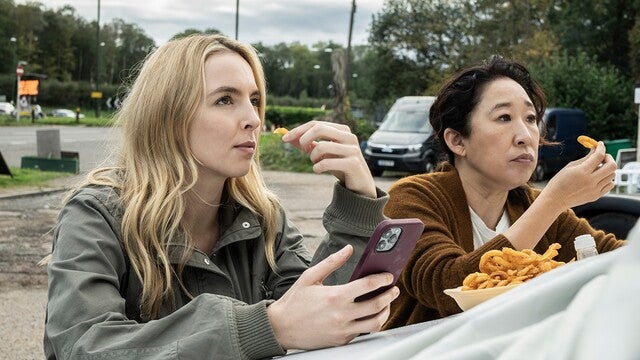Killing Eve helped me fight my battle with alcohol addiction
When I saw Villanelle carry out her first flamboyant (yet gruesome) kill, it gave me a sense of relief that I couldn’t easily explain


If you’ve walked across Tower Bridge recently, you might have noticed an array of impromptu memorials for a young lady named Oxana Astankova. She was a young, beautiful and fiercely-fashionable Russian assassin, who was recently killed by being shot and drowning, after an operation on a boat named the Dixie Queen to bring down a crime syndicate called “The Twelve”.
With so many world events dominating the news agenda, you might think “oh, I missed that one”. But the reality is, the death of Oxana (otherwise known as Villanelle) is a work of fiction.
As it happens, I remember watching an episode of Killing Eve when I was in a psychiatric hospital back in 2018. There was something ironic about being on a ward with “psychopaths” watching a TV show about a psychopathic assassin.
Up until then, I’d never allowed myself to get into a TV series, because I was very much a “workaholic”. But when I left the men’s eating disorders charity I founded to focus on my recovery from complex PTSD and alcohol addiction, I suddenly found myself with a lot of time on my hands.
When I returned home following discharge, I began watching series one of Killing Eve from the start and for the first time ever I felt myself being able to emotionally connect with a TV show – or, more specifically, the characters and their unrivalled onscreen chemistry.
Before I dived into the alien world of television, my main indulgence had always been wine. Following a traumatic incident in early 2015, I used alcohol to mitigate the effects of unwanted feelings and distressing thoughts. In other words, I unwittingly used alcohol to anaesthetise myself from my emotions.
Over time, I became emotionally cut off from myself and the world. When I detoxed the flood of emotions would rise back up to the surface during brief periods of sobriety, and it wouldn’t be long until I’d be staring into the face of relapse. Ultimately, I associated being “emotional” with bad things: chaos, drama and self-loathing.
When the first lockdown hit, I had been discharged from psychiatric hospital for a fourth time, after what I had hoped would be my final detox from alcohol four months prior. I’d already signed up for specialist trauma therapy with a local charity regarding the 2015 incident, which helped keep both my sanity and sobriety on track. In those sessions, the subject of “identity” became a recurring theme and it reminded me how many times mental health professionals had said to me in recent years that I’d “lost my identity”.
While I begrudged these comments at the time, deep down inside I knew it was probably true. Eight years of alcohol abuse, layered over many years of trauma, often means your history informs your identity. At that point, I’d realised there’s so much more to me than just being a “recovering alcoholic”.
Admittedly, when I saw Villanelle carry out her first flamboyant (yet gruesome) kill, it gave me a sense of relief that I couldn’t easily explain. Being the protagonist and antagonist combined, the chemistry between herself and her love interest Eve reminded me of many of my past relationships. There is no such thing as bad guys or good guys per se – just people who do good things and bad things.
Another way of looking at it is that you can be a good guy in one person’s story and a bad guy in someone else’s, and your role will inevitably change several times in any given timeline. What’s more, they were characters presented as complex and their lives reflected that. Finally, the guilt and shame about my past experiences weren’t so overwhelming and I could begin to process a backlog of negative feelings. Most importantly, these insights helped me build the foundations for a better understanding of my own life experiences and acknowledge all the sides that, to me, make up the kaleidoscope of my true identity.
To keep up to speed with all the latest opinions and comment, sign up to our free weekly Voices Dispatches newsletter by clicking here
While the snobbery around “read more books rather than watch TV” still exists, I think it was TV shows like Killing Eve, Fleabag, I May Destroy You, Sex Education and many others that enabled me to explore my past trauma and the big question of “who am I?” at 36.
Now, I’m writing a book about recovery from my trauma and alcohol addiction, and my journey of self-discovery.
Looking back, I doubt I would have even started writing if it weren’t for being introduced to Killing Eve while I was in hospital. As the saying goes, never judge a book – or TV show in this instance – by its cover. You never know, you might just learn something about yourself that you never expected.
Sam Thomas is a writer, speaker and mental health advocate
Join our commenting forum
Join thought-provoking conversations, follow other Independent readers and see their replies
Comments
Bookmark popover
Removed from bookmarks